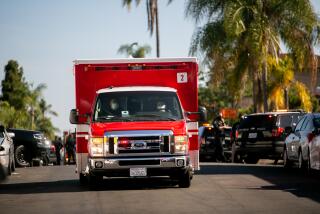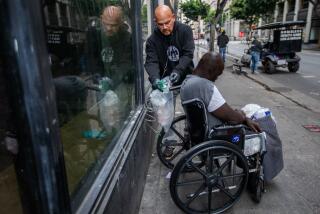2 pledges made to save a small life
- Share via
Snow and ice were making the narrow lanes and sharp curves of the Pennsylvania Turnpike even more treacherous than usual. Built for easygoing roadsters, the highway lacked the necessary shoulders and lane width to guarantee safe passage for time-pressed 18-wheelers; a fragile metal rail in the slim median was all that separated the vehicles hurtling in opposite directions. But the ambulance driver was careful and experienced.
Mindful of the urgency of our mission, he maneuvered through the speeding traffic with professional skill, barely jostling me as I prepared an infant incubator, oxygen tanks and resuscitation equipment. A premature baby was waiting for us at a rural hospital in Ohio, and every minute of delay counted against his prognosis.
We had left our urban medical center oasis in Pittsburgh for this small hospital more than 70 miles away. We arrived and unloaded almost two hours later -- rolling our mobile incubator and equipment down the dark and dank corridors smelling of rubbing alcohol and urine, whose peeling walls were shedding plaster and paint that lay strewn on the cracked linoleum floor.
We tracked down the delivery room and found a relieved family physician supplying whiffs of oxygen with a bag and mask to a tiny infant struggling to breathe. Having had training in neonatal medicine, I immediately set to work intubating the infant for a more effective delivery of oxygen to his lungs, and smiled to see the bluish tinge of his skin transform to a healthier beige. I then started a minuscule IV, placing a needle the size of a small pin in a visible vein in the baby’s scalp. Soon our young patient was ready for the voyage back to our newborn intensive care unit (NICU).
There was unfortunately little time to spend with the family. Because seconds counted during transports, the local physician would have to fill the role of counselor for the understandably distraught parents.
I didn’t normally allow myself to dwell on the panic and desperation in the faces of the parents as they watched their babies being wheeled away into the ambulance’s maw. As a young intern, my focus was on ensuring the babies’ survival, not on comforting mothers and fathers whose infants had been abruptly taken from the womb to struggle for their lives in strangers’ hands many miles away.
But I can still remember, even now, the plea from this baby’s mother for me to take good care of her son. Our eyes met, and I nodded as she passed the torch to me. I accepted my duty with a reassuring promise.
Back in the ambulance, I quickly hooked up the infant’s ventilation bag to the van’s oxygen tanks. The preemie’s color remained good, and I gave the driver the thumbs-up to be on our way, pumping the bag to manually feed oxygen through the endotracheal tube. As the driver wended his way through trucks and cars on the busy turnpike, I continued to pump the bag at a steady rhythm, ignoring the ache in my fingers, looking forward to our arrival at the NICU when a mechanical respirator could replace my efforts.
And then we stopped -- suddenly -- in the dark. I looked up from my charge to see vehicles whizzing by us on our right. I turned to the left and saw the opposing traffic with alarm. We had broken down in the left lane of the turnpike with no adjacent shoulder, just after a steep hill and a blind curve.
My driver tried in vain to restart the engine. I held my breath and tried to block out the sound of screeching tires as cars swerved to avoid us. We had passed many cars and -- what now seemed worse -- many large trucks on the hill behind us. Would one of those vehicles now be following, rounding the curve in the left lane not knowing that our ambulance was an obstacle ahead? I looked down at my tiny patient cocooned in his incubator, oblivious to our danger, breathing oxygen pumped by my hand. If a truck or large car rear-ended us at freeway speed, the accident could transform our oxygen- and fuel-laden ambulance into a ball of flame.
The driver leapt out of the ambulance and shouted for me to exit as well. My instinct for survival told me that the driver and I could both escape a possible inferno by running away along the median rail to a more visible location and waiting for help. But my little patient had no such options -- moving him would be complicated and risky. For him to survive, I had to stay by his side and continue pumping oxygen into his lungs.
I had already learned during my internship to stand by my patients despite exhaustion and discomfort. It was my duty as a physician to put my own needs aside to care for people who had entrusted their lives to me. But never before had I considered that that pledge might risk my own life. Was my obligation first to my patient or myself?
For me, there was no choice. I had to keep my promise to the mother, and I had to honor my commitment to her son. I yelled back at the driver to run down the lane by himself and try to stop the traffic bearing down on us, and I stayed at my post for what felt like an eternity, forcing my eyes to monitor my tiny patient’s chest as it rose up and down with each assisted breath.
Suddenly, the ambulance jolted. Startled, I turned toward the rear door. It opened to reveal our driver and, behind him, a truck driver who had come to our aid. Warned by other drivers on his CB about our danger, he had approached our breakdown slowly, then parked his rig behind us to keep other vehicles away. And, thanks to his radio, we soon had another ambulance join us and were able to transport our young patient to the NICU with minimal additional delay.
My patient did well in the hospital and was discharged a few weeks later to his joyful parents. I accepted their thanks for my care and returned my own. I had always given lip service to one of the core values of being a doctor -- duty over self. My experience with their son had been a critical trial -- had I left the infant in the ambulance and scrambled to safety, I would have belied my oath to my patients, and my own standards to myself.
I was grateful that, tested, I had stood by their son, and by the physicians’ code.
Linda Reid Chassiakos, a clinical assistant professor of pediatrics at UCLA’s David Geffen School of Medicine, is co-author (with Deborah Shlian) of the medical mystery thriller “Dead Air.”
More to Read
Sign up for Essential California
The most important California stories and recommendations in your inbox every morning.
You may occasionally receive promotional content from the Los Angeles Times.













